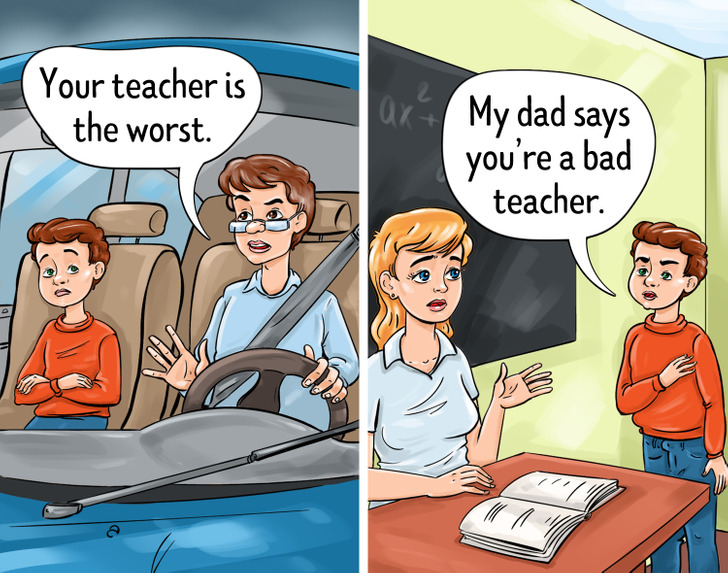1. An extremely emotional drop-off at school
Many youngsters start sobbing and expressing a lot of emotion when they start school for the first time or when they come back from a fantastic summer. They don't want to be cut off from their parents, who provide them with a secure haven. However, parents who have to let go of their children might sometimes have emotional outbursts. As a result, they frequently both begin sobbing close to the schoolyard's entrance.
Since kids catch up on your worry and anxiety and respond similarly, the first thing you need to do is manage your own feelings about it. Furthermore, since your child's anxiousness will just grow, waiting till they stop weeping won't help. Simply bid them farewell, get back in the car, and try to hold back the emotions while driving. Taking your child to the school before it's time for them to go there would be a smart move to help them get used to the setting.
2. Giving kids no assistance with their homework or time management
However, it will take some time and effort on your part before you can teach your children independence, which is very important. To learn how to organize their time and complete their assignments, children initially require coaching. They might not be aware that they must start preparing now if they have a project for school that is due the following week. They shouldn't wait until the last minute, which is a lesson you should teach them as parents.
Even teenagers may require supervision and assistance at the start of the academic year. Since they carry a heavier workload than anybody else, they can experience overload. Despite the fact that you may lack teaching expertise, you may nonetheless provide the assistance that you are able to. Your advice on how to prioritize tasks and manage your time can be quite helpful.
3. Exaggerating your own anxieties in front of the kids
When it's time for their children to go to school, parents experience the same level of worry, if not more. They understand how crucial it is to present a positive image and perform well in the classroom, which explains why. They make the error of passing on their anxieties to their kids, without recognizing the harm it may do. It's crucial that the child understands some things, but worrying about them won't help.
You can speak with a therapist if you believe that your stress levels are excessive due to the return to school. They will aid in your anxiety control so that it doesn't affect your child. To ensure that it doesn't affect your kid, it's critical to understand the cause of your elevated anxiety levels and develop a means to cope with it.
4. Not purchasing the equipment a youngster needs
Parents frequently believe they are completely aware of what their kids need for school. But since they won't have access to many of the materials they require, your child can find that uncomfortable. You can phone the school or the teacher and inquire about what is required if you are unsure what is required. It's usually advisable to have your child carry them just in case, even if you believe that the school can offer some of the necessities.
Additionally, bear in mind that cutting-edge, eye-catching products aren't always the ideal choice. It doesn't always imply that a pencil will function well because it bears an image of your child's preferred cartoon character. With all that plastic covering them, sharpening them could be more difficult. Additionally, you can have to invest a little more cash if it's feasible to get the superior brand rather than the more affordable one.
5. Overloading kids' calendars with activities
Some parents make the error of packing their children's schedules with many activities each day of the week in the mistaken belief that the more activities they participate in now, the better prepared they will be for the future. Yes, if your child wants to participate in an activity, it will be extremely useful, but they shouldn't occupy all of their spare time.
Children need downtime just as much as adults do, and its value cannot be overstated. Even if adolescents may be more energetic, kids still require some alone time to play their preferred games in their rooms. Asking the child about their preferred activities can help you create a timetable that will remain consistent throughout the school year.
6. Critiquing the instructional personnel in front of the students.
It may be quite difficult when parents and teachers can't agree on everything. However, criticizing the teaching staff in front of their children is the worst thing parents can do. Children ought to be allowed to establish their own ideas about other people without having those opinions shaped for them by others. This might lead to a lot of stress in the classroom and have a poor impact on the education of the kids.
According to studies, instructors who get along well with a student's parents are more inclined to invest time and energy in that student's education. While it's acceptable to feel differently, keeping a positive connection with the teaching staff may be highly advantageous for your child.
7. letting kids skip their first days of school
Even if there isn't much going on academically in the first few days of school, it's still crucial that the kids show up. It's a moment when new expectations, regulations, and connections between the students and instructors are formed. It's preferable to bring a new student to a class where everyone has already bonded than to introduce a new student to the full class at once.
Making sure the new student feels involved and welcome also becomes a more difficult task for the instructor. Due to how quickly friendships form among children, skipping only one week of school might result in many children having formed new friends.







Comments
Post a Comment